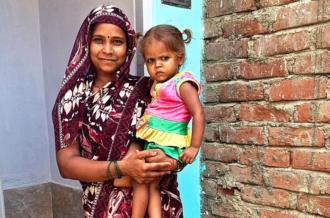India’s Badaun village gets toilets for women
Over 100 toilets are built months after alleged rape and death of two girls as they walked out to answer nature’s call.

Katra Saadatganj, Badaun, India – On Sunday afternoon, a group of women teased each other over who would be the first to use the new toilets constructed in their village in the northern state of Uttar Pradesh. They picked on Neetu after the 15-year-old declared that she would “never again” have to defecate in the fields.
“I’m going to use the toilet in the evening,” she said.
Keep reading
list of 4 itemsHere’s how to help earthquake-hit Morocco reduce the risk of disease
How much plastic is in our oceans?
Despair in Ettadhamen: The harsh reality of Tunisia’s economy
The women burst out laughing when Gita, 25, a neighbour, pointed out that no one had to wait until it was dark. “We can go anytime in our own toilets,” she said.
|
|
| India’s toilet issue remains despite promise |
The group nodded sympathetically as Gita recalled the painful experience of wanting to relieve herself after every few hours during her pregnancy. “My baby girls will grow up without this humiliation,” she said.
They live in the village of Katra Saadatganj, where the threat posed to women by the lack of toilets was starkly exposed after two young girls were found hanging from a tree on the morning of May 27.
The narrative, at the time, was that the two cousins had gone missing when they went to relieve themselves in the evening. Three brothers, accused of gang-rape and murder, were arrested.
Reacting to the tragedy in the Indian village, UN chief Ban Ki-moon said in June, “I was especially appalled by the brutal rape and gruesome murder of two teenage women in India who had ventured out because they did not have access to a toilet,” he said.
Indian Prime Minister Narendra Modi completes 100 days in office on Tuesday, however, the ruling Bharatiya Janata Party’s promise to build five million toilets during the first three months of its rule has not materialised.
The World Bank has found that over 600 million people – 53 percent of households – in India, which has a population of 1.2 billion, defecate in the open.
‘Safer and healthier’
Concerns about the scarcity of toilets have largely focused on the health hazards linked to the lack of sanitation. For instance, open defecation is one of the leading causes of diarrhoea, a disease, which kills 334,000 under-five-year-olds every year in India.
 |
| Bindeshwar Pathak, chief of Sulabh International, which is building the toilets in Katra Saadaatganj [Betwa Sharma/ Al Jazeera] |
But it is now being connected to the widespread problem of sexual violence in the country. Women and girls are especially vulnerable to being attacked when they go to relieve themselves before sunrise or after sunset in isolated spots in the countryside as well as urban areas.
Over the weekend, Sulabh International, a social service organisation, made 108 “two pit” toilets, which cost Rs 40,000 ($661) each, available for free in Katra Sadaatganj.
The organisation, which plans to build 250 more toilets in the village of 750 households, used funds from its pay-for-use public toilet service to finance the project.
“One toilet can transform the entire life of a woman by making her safer and healthier, and then women have the power to transform their families,” Bindeshwar Pathak, chief of Sulabh International, told Al Jazeera.
One blue toilet booth stands outside the home of Sohan Lal, the father of younger deceased girl.
“I’m happy that these toilets will prevent other girls from the same fate as my daughter,” he said.
But his elderly mother, whose eyes brimmed with tears, said, “Nothing will bring back our daughters.”
New case details
The narrative around the deaths of the girl has changed since Sulabh International chose Katra Saadatganj to construct toilets over the summer.
Last month, federal investigators from the Central Bureau of Investigation said that forensic evidence had ruled out rape, but the murder investigation continues.
In June, AL Banerjee, the police chief in the state, had cast doubt over the rape of one girl.
He also suggested that the hangings could be honour killings committed by the family because of a friendship between the girls and one of the accused men.
“Would we have asked for the CBI inquiry if we had done it?” Sohan Lal told Al Jazeera. “The CBI should look at the bodies before saying that it was not rape.”
The CBI also found out that the initial post-mortem was conducted by inexperienced professionals, which led them to exhume the bodies. But investigators could not carry out the digging because the burial spot, which is on the banks of the Ganges, was flooded during the monsoon season.
Pathak, however, said that the altered account of the murder did not detract from his organization’s mission. “All over the country, women are at grave risk of being raped when they go into the fields,” he said.
While nationwide data on rapes linked with the lack of toilets is not available, reports of women being attacked while going to the fields are frequently reported in the media.
 |
| “My baby girls will grow up without this humiliation,” Gita said [Betwa Sharma/ Al Jazeera] |
Last year, a senior police official from the state of Bihar said that almost half of the 872 rapes in the state occurred because women went out to defecate in the open.
Nina Srivastava, who heads the Patna-based Equity Foundation, said that 80 percent of rural households in Bihar did not have toilets.
She said in the flood prone locales of the Madhubani district, where her foundation works, women even struggled to find dry spots.
“They are at higher risk of being attacked because they are alone in the villages after their husbands migrate to find work outside their flooded areas,” she said.
A 2012 study on sanitation in urban areas by Dasra, a Mumbai-based philanthropic foundation, said “traveling long distances to access public facilities makes them potentially vulnerable to physical and sexual assault.
A UN survey suggests that it is not uncommon for girls and women in such conditions to be harassed, physically assaulted and raped and that in New Delhi slums, up to 70 percent of girls experience humiliation everyday in terms of verbal harassment and half of them have been victims of grave physical assault”.
Modi’s campaign
On Independence Day, Prime Minister Modi announced the “Clean India” campaign for the next four years, which begins with equipping all schools in India with toilets including separate facilities for girls.
Under the Total Sanitation Scheme launched in 1999, below-poverty-line households were eligible to receive Rs 3,500 ($58) to construct a toilet. The amount, which was increased to Rs 10,000 ($165) under the previous Congress Party-led government, has been raised to Rs 15,000 ($248) for rural households under the present administration.
In his speech, Modi told Indian lawmakers to use the Rs 50m (over $833,000) from their Member of Parliament Local Area Development Scheme fund to construct toilets, and he also called on corporations to contribute.
Days after Modi’s speech, two of India’s major corporations pledged Rs 1bn ($17m) each to build toilets.
 |
| Sheeba, younger sister of Neetu, stands near the fields of millets, which they used as toilets [Betwa Sharma/ Al Jazeera] |
There are other signs that efforts to spread awareness about the necessity for toilets have created an impact. The local administration recently authorised the construction of toilets in a village in Uttar Pradesh after six newlyweds left the homes of their husbands due to the absence of any toilets.
But the main concern remains that money to build public toilets, the bulk of which are provided by the central government, do not reach the people.
Activists pointed out that funds are either lost or delayed as the money trickles down several layers of the state bureaucracy. Some proportion of the funds, they say, is also at risk of being swiped by corrupt officials and the members of village councils.
Kamal Kant Tiwari, head of the village council in Katra Saadatganj, said that 387 houses were identified as eligible for toilets in 2010. “But the money never came,” he said. “The old toilets were made cheaply so these did not survive long,” he said.
Instead of relying on state authorities to implement the scheme, Pathak said that the central government should train men and women, who would act as door-to-door agents for the construction of toilets across the country, These agents, he said, would be awarded monetarily for every family that they convinced to take advantage of the government scheme to build a toilet.
“Social development has to be achieved by economic incentives,” he said.
Follow Betwa Sharma on Twitter: @betwasharma